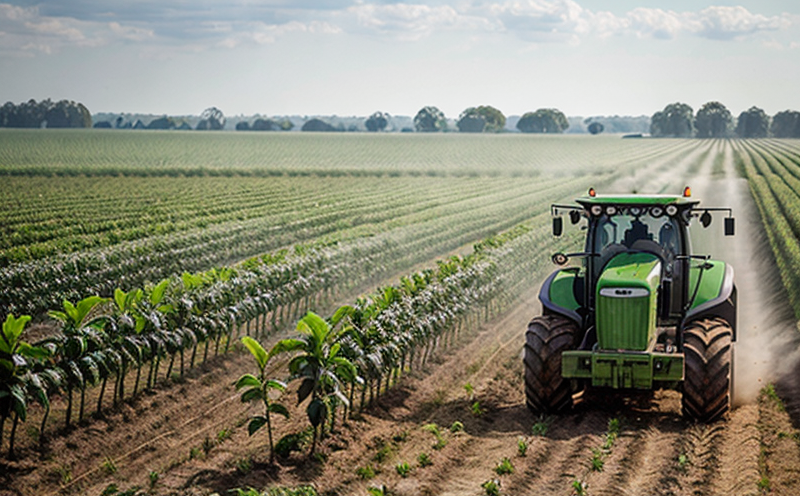AOAC 2007 Pesticide Residue Testing in Agricultural Foods
The AOAC Official Method 989.13, known as the AOAC 2007 method for pesticide residue testing (PRT), is a widely recognized and accepted standard used globally to ensure food safety by detecting pesticides present in agricultural products such as fruits, vegetables, grains, and oils.
This method involves several critical steps that are designed to minimize false positives while ensuring accurate detection of even trace amounts of pesticides. The process begins with thorough sample preparation, which includes washing the produce under running water followed by sonicating it in an aqueous solvent containing surfactants. This step ensures that all pesticide residues adhere to the surface and are easily extracted.
The extracted samples undergo a clean-up procedure using solid-phase extraction (SPE) cartridges or liquid-liquid partitioning, which removes interfering substances such as fats, proteins, and other compounds that may interfere with the detection process. Following this step, the residues are concentrated for analysis by gas chromatography (GC).
The GC system is equipped with an electron capture detector (ECD) capable of identifying various pesticides based on their unique retention times and peak areas. For accurate identification, spectral data from mass spectrometry (MS) can be used in conjunction with the ECD.
The AOAC 2007 method has been validated to detect over 150 different types of pesticides at concentrations ranging from parts per billion (ppb) down to parts per trillion (ppt). This sensitivity allows for comprehensive monitoring and control of pesticide residues, ensuring compliance with international food safety standards.
Compliance with this method is particularly important given the increasing public awareness about the potential health risks associated with excessive pesticide exposure. Regulatory bodies around the world, including the U.S. Environmental Protection Agency (EPA) and European Food Safety Authority (EFSA), have adopted or recommended the use of this standard for ensuring food safety.
Our laboratory adheres strictly to the AOAC 2007 method, employing experienced analysts who understand its nuances and can provide reliable results. By utilizing state-of-the-art instrumentation and following stringent quality control protocols, we ensure that every test conducted meets or exceeds the required standards.
The application of this method extends beyond mere detection; it also plays a crucial role in supporting research and development efforts aimed at improving agricultural practices and enhancing food safety. Researchers can use data from these tests to identify trends in pesticide usage, evaluate new formulations, and develop strategies for reducing harmful residues without compromising crop yield.
Moreover, the AOAC 2007 method serves as a valuable tool for quality control departments within manufacturing facilities that handle agricultural products. By regularly testing incoming raw materials using this standardized approach, companies can maintain consistent product quality and avoid potential recalls due to unsafe levels of pesticides.
Benefits
Implementing AOAC 2007 pesticide residue testing offers numerous advantages for both food producers and consumers:
- Enhanced Safety: Detects trace amounts of pesticides, ensuring that food products meet stringent safety standards.
- Informed Decision Making: Provides valuable data to support research and development initiatives focused on sustainable agriculture practices.
- Regulatory Compliance: Ensures adherence to international regulations set by bodies like the EPA and EFSA.
- Credibility: Builds trust with customers who value transparency regarding food safety measures taken during production processes.
Eurolab Advantages
At Eurolab, we pride ourselves on providing top-tier services that go above and beyond industry expectations. Our commitment to excellence is reflected in our state-of-the-art facilities equipped with cutting-edge technology capable of delivering precise results consistently.
We employ highly skilled professionals who possess extensive experience working with the AOAC 2007 method. Their expertise ensures accurate interpretation of complex data sets and timely delivery of reports tailored specifically to meet client needs.
Our comprehensive quality assurance program guarantees that each test conducted adheres rigorously to established guidelines, thereby maintaining high levels of accuracy and reliability across all projects undertaken by our team.
In addition to offering AOAC 2007 pesticide residue testing services, Eurolab also provides other related analyses such as mycotoxin screening, heavy metal analysis, and allergen detection. These additional offerings complement the core service portfolio, allowing us to address a broader range of client requirements more effectively.
By choosing Eurolab for your AOAC 2007 pesticide residue testing needs, you can rest assured that you are partnering with a leader in the field committed to delivering exceptional service and results every time.
Competitive Advantage and Market Impact
The ability to reliably perform AOAC 2007 pesticide residue testing positions Eurolab as a key player in maintaining global food safety standards. Our expertise in this area allows us to stay ahead of emerging trends in agricultural science, enabling us to provide timely insights into best practices that can help businesses operate more efficiently while staying compliant with regulatory requirements.
Our commitment to innovation extends beyond just performing tests; it includes continuous improvement efforts aimed at refining methodologies and expanding our service offerings. By doing so, we ensure that clients have access to the latest tools and techniques needed to address evolving challenges in their respective industries.
The demand for accurate pesticide residue testing is driven by growing consumer awareness about health concerns linked to pesticide exposure. As a result, manufacturers are increasingly turning to laboratories like Eurolab for assurance that their products comply with strict safety criteria. This not only enhances brand reputation but also fosters long-term relationships built on mutual trust and respect.
Furthermore, our involvement in research projects related to sustainable agriculture contributes significantly to the broader conversation around food security. By participating in these initiatives, Eurolab helps drive forward solutions that promote responsible use of pesticides while supporting overall ecosystem health.





